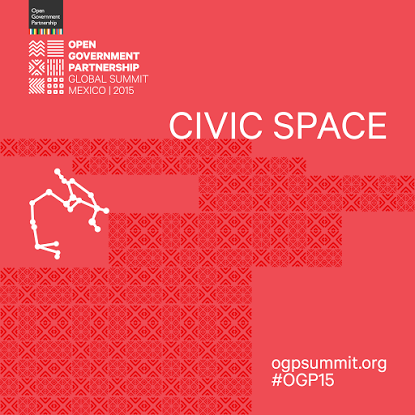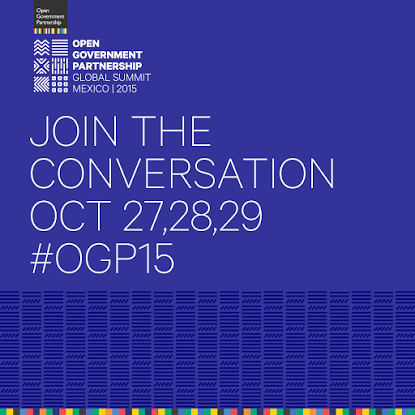Working together to protect civic space
There can be no doubt that we are witnessing a global trend that devalues and restricts the role civil society can play in building just and equal societies. This trend cuts across categories of wealth, geography, and political system, with countries in the global north and south seeing increasing restrictions on freedom of expression, association and assembly. According to CIVICUS, in 2014 serious threats to civic freedoms occurred in 96 countries. In short, in too many contexts civil society’s very existence – let alone being able to hold governments and the private sectorGovernments are working to open private sector practices as well — including through beneficial ownership transparency, open contracting, and regulating environmental standards. Technical specificat... More to account – is at grave risk.
Oxfam recognises that it is national civil society and our partner organisations that are most at risk and can face very real threats of violence when they speak out on rights violations. We know that emerging technology is a double-sided coin enabling citizens to amplify their voice like never before but also providing unprecedented opportunities for surveillance of activists. Also in limited circumstances, we see governments justifying overly burdensome restrictions on all legitimate civil society activity by pointing to the abuse of NGO structures by extremist groups.
We know the situation is critical and getting worse, yet where is the response to match the threat? Oxfam stands in solidarity with international and local NGOs in defending the operating space they need to do their work alongside and in assistance of poor and vulnerable communities. The space for ordinary people to exercise the defence of their human rightsAn essential part of open government includes protecting the sacred freedoms and rights of all citizens, including the most vulnerable groups, and holding those who violate human rights accountable. T... and civil liberties has been – and continues to be – hard won. Basic freedoms of speech and association, and the right to organise and participate, are being eroded in many countries, and civil society has a legitimate role to play in working with people to shore up these rights. The repression of civil society can take many forms – sometimes blatant and sweeping, but often too in more subtle ways, such as onerous bureaucracy, restrictive laws, harassment and threats.
While reputable human rights organisations, and many politicians, diplomats and academics, are reporting an increase in the repression of civil society, Oxfam also believes that the numbers of individuals and organised groups prepared to stand up, in the defence of others, will inevitably keep pace. Oxfam will continue to work to support civil society organisations, activists and campaigners in organising themselves in order to defend their rights, develop opinions and ideas, and to make their voice heard as a countervailing power. In order to do so, we need to engage governments. The protection and defence of civil society has to emerge from governments, private sector and responsible action from civil society itself. Oxfam is a supporter of the Open Government PartnershipThe Open Government Partnership (OGP) is a multi-stakeholder initiative focused on improving government transparency, ensuring opportunities for citizen participation in public matters, and strengthen... More for these very reasons.
We recognise that our response needs to be more pro-active, strategic and better coordinated. Reactive risk management and damage control is not good enough. With influencing at the core of how Oxfam seeks to achieve change at scale, the risks are all the starker. Additionally, we must realise that civil society (Oxfam included) has at times fallen short of meeting reasonable administrative and transparencyAccording to OGP’s Articles of Governance, transparency occurs when “government-held information (including on activities and decisions) is open, comprehensive, timely, freely available to the pub... More requirements. To maintain our legitimacy, we must at all times strive for the highest levels of professionalism, hold ourselves accountable to the same standards we demand of others, and get more effective at communicating our impact.
How can we expect to mobilise the power of people against poverty, and campaign on politically charged themes such as inequality and climate change unless there is capacity of and space for civil society to voice dissent, organise, and act? We believe that the OGP is a platform that provides opportunities for constructive debate and dialogue by bringing together government and civil society to jointly address issues related to civic space. Governments that are open and transparent are more willing to engage with civil society. Similarly, civil society that is robust and representative of people’s needs is interested in finding ways to work with government to bring about positive change. Oxfam is excited to engage in the upcoming OGP summit and address these questions. We invite you to join the conversation at the OGP Summit and beyond.
*****
On October 27, the Civil Society Day, Oxfam is involved in three sessions relevant to civic space:
- At 2pm Oxfam is part of a session focussing on tools and approaches to protect CSO space where we will be highlighting specific tools, tactics, and approaches that can be used in protecting and defending shrinking space in different country contexts.
- Also at 2pm, Oxfam will be participating in a session which explores the ways in which progress towards the SDGs will be affected if civic space is not adequately defended.
- At 3.30pm Oxfam will lead a session titled “Understanding civic space: Concepts, trends and affects”. This session aims to:
- deconstruct and discuss the term ‘civic space’ and ‘civil society’ and the complexity of the term,
- analyse the underlying trends that have led to shrinking space, so that CSOs respond to these trends effectively in a way that is agile and responsible,
- explore the effects of shrinking space on programmes, campaigns and humanitarian responses through country case studies from Brazil, Mexico, Cambodia and Kenya, and
- provide specific recommendations on how to strengthen civil society organisations in fragile, complex and challenging environments.
On October 28, Winnie Byanyima, the Executive Director of Oxfam International, via a video message, will share the vision for Oxfam and the role it can play in protecting civic space and working constructively with government representatives.
On October 29, Oxfam’s one hour session will focus on innovative ways for combating shrinking civic space. This session will build on the discussion and learning from the sessions on the 27th. During the session, representatives from government, donor group and national and international civil society will engage in a discussion to understand the trends in terms of role and space for civil society in different countries. From there on it will explore new ways of supporting civic space and the enabling environment for civil society as a critical precondition for a functioning OGP and achievement of the SDGs.


